八年级英语下册Unit3Couldyoupleasecleanyourroom(情态动词can与could用法归纳)素材(新版)人教新目标版
2019年八年级英语下册 Unit 3 Could you please clean your room知识点总结 (新版)人教新目标版
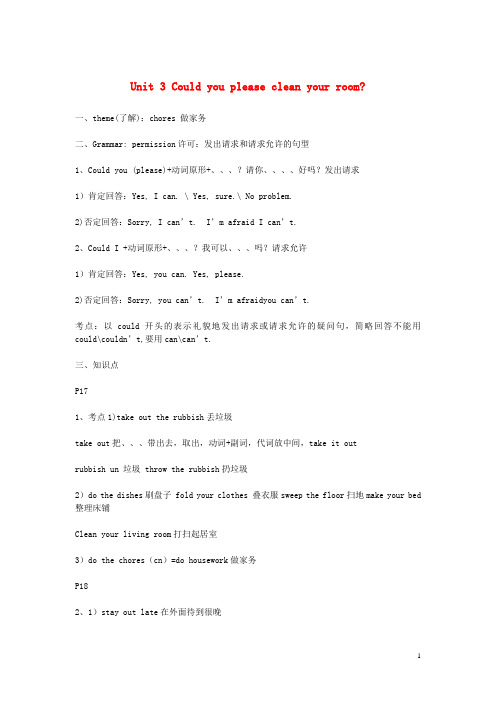
Unit 3 Could you please clean your room?一、theme(了解):chores 做家务二、Grammar: permission许可:发出请求和请求允许的句型1、Could you (please)+动词原形+、、、?请你、、、、好吗?发出请求1)肯定回答:Yes, I can. \ Yes, sure.\ No problem.2)否定回答:Sorry, I can’t. I’m afraid I can’t.2、Could I +动词原形+、、、?我可以、、、吗?请求允许1)肯定回答:Yes, you can. Yes, please.2)否定回答:Sorry, you can’t. I’m afraidyou can’t.考点:以could开头的表示礼貌地发出请求或请求允许的疑问句,简略回答不能用could\couldn’t,要用can\can’t.三、知识点P171、考点1)take out the rubbish丢垃圾take out把、、、带出去,取出,动词+副词,代词放中间,take it outrubbish un 垃圾 throw the rubbish扔垃圾2)do the dishes刷盘子 fold your clothes 叠衣服sweep the floor扫地make your bed 整理床铺Clean your living room打扫起居室3)do the chores(cn)=do housework做家务P182、1)stay out late在外面待到很晚2)get a ride 搭便车 3)need to do sth 需要做某事(need实义动词)need do sth(情态动词)4)have to do sth 不得不做某事3、1)help (sb) out with sth帮助(某人)做某事(常指帮助某人摆脱困境)2)at least至少3)finish doing sth做完某事4、1)Two hours of TV isenough for you.短语(名词短语、现在分词短语、不定式短语)作主语,谓语动词用单数。
洛阳市八年级英语下册Unit3Couldyoupleasecleanyourroom总结(重点)超详

洛阳市八年级英语下册Unit3Couldyoupleasecleanyourroom总结(重点)超详细单选题1、—________ I go to the movies with Anna tonight, mom?—Of course you ________. But don’t stay out too late.A.Could, canB.Should, shouldC.Could, wouldD.Can, should答案:A句意:——妈妈,我今晚能和安娜去看电影吗?——当然可以。
但是不要在外面待得太晚。
考查动词辨析。
could可以,表委婉;can可以;should应该;would将会。
根据“...I go to the movies with Anna tonight, mom?”可知,第一处请求允许,排除B;第二处强调“可以”,且一般疑问句“Could you...”的肯定回答,需用“Yes, I can”。
故选A。
2、I will do some cleaning as soon as I my homework.A.finishB.will finishC.has finishedD.finished答案:A句意:我一完成我的作业,我就打扫卫生。
根据as soon as 一 ---就---,引导时间状语从句,当主句是一般将来时态时,从句不用将来时态,用一般现在时态代替;故选A。
3、My mother is hard-working. she does for my family, she feels.A.More; happierB.The much; the happyC.The more; the happierD.The most; the happiest答案:C句意:我妈妈是努力工作的,她为我们家人做的越多,她感觉越高兴。
根据 the +比较级,the+比较级越---就越---; more更多, happier更幸福, much多, happy幸福,most最多,happiest最幸福;故选C4、—When does the online class begin, Mrs. Grace?—At eight o'clock. Tell Cindy __________late.A.not beB.not beingC.not to be答案:C句意:——网上课程什么时候开始,Grace夫人?——8点钟。
八年级英语下册 Unit 3 Could you please clean your

Unit 3 Could you please clean your room(Seciton B 3a-self check)学习目标:1、我要学会运用本单元的目标语提出客气的请求或征求许可。
2、我能综合掌握情态动词could的用法。
3、我能更好地解决生活中或学习中出现的问题和麻烦。
当堂测评分层达标基础落实★一、翻译下列词组:1. 倒垃圾____________________2. 叠衣服____________________3. 扫地板______________4. 整理床铺______________5. 出去吃饭_______________________6. 搭便车_____________________7. 生某人的气______________ 8. 放学回家__________________ 9. 过来\顺便拜访__________________________10. 扔下____________________ 11. 一直____________________ 12. 吃惊地____________________13. 做家务____________________ 14. 向某人借某物___________ 15. 把某物借给某人_____________________16. 邀请某人参加聚会___________________ 17. 为了_____________________ 18. 依靠_______________发展能力★★二、根据提示完成下列句子1. I’m going to _______ (work out / work on) my computer.2. My mother likes to _____ (make / do) breakfast.3. His grandfather is a great ____ (cook /cooker).4. I like cleaning the bike because it’s __________ (boring / interesting).5. I invited him ______________ (play) the game.6. It took me an hour ______________ (write) the letter.7. I spend two hours __________ (do) my homework.8. We _____________ (make) the bed just half an hour ago.9. 我不明白他为什么离开。
八年级英语下册-Unit-3-Could-you-please-clean-your-room-Se
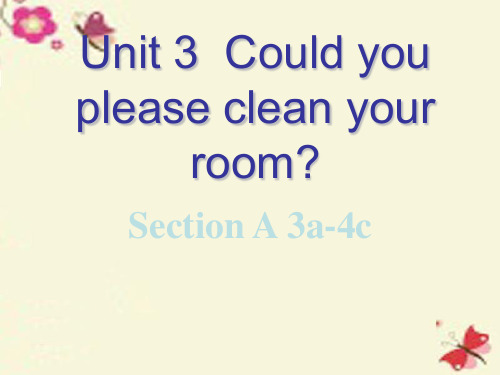
3b
Read the sentences below. Underline the sentences from the reading that mean the same thing.
1. Neither of us did any housework for a week. For one week, she did not do any housework and neither did I. 2. My mom came over as soon as I sat down in front of the TV. The minute I sat down in front of the TV, my mom came over. 3. You're tired, but I'm tired, too. Well, I work all day at school, too! I'm just as tired as you are!
not to get it wet.
1—d 2—a 3—c 4—e 5—b
4b Fill in the blanks in the conversation.
A: I hate to __d__o__ chores.
B: Well, I hate some chores too, but I like other chores.
2. Could I watch one show first? (noun) ___C_o_u_l_d_y_o_u__p_l_ea_s_e__sh_o_w__m__e_y_o_u__r_n_e_w__b_o_o_k_?__(v_e_r_b_)___ 3. I can't work all day. (verb) __I_t_’s__d_if_f_ic_u_l_t_t_o_f_in__d_w__o_rk__i_n_t_h_i_s_c_it_y_._(_n_o_u_n_)________ 4. You watch TV all the time. (verb) __H__o_w__m__u_c_h_i_s_t_h_a_t_w_a_t_c_h_?__(n_o_u__n_) _________________ 5. “What happened?” she asked in surprise. (noun) __I_t_w__o_n_'t__su__rp__ri_s_e_m__e_i_f_h_e_l_o_s_e_s_t_h_e_e_x_a_m__. _(v_e_r_b_)_____
八年级英语下册 Unit 3 Could you please clean your
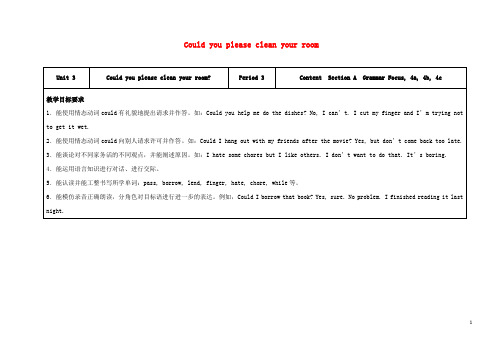
Could you please clean your room1教学过程活动步骤教与学活动目的及其操作教学资源运用复习时间5 m 1复习已学目标语和导入有礼貌地提出请求和向别人请求许可的话题。
M: Could you please take out the trash?N: No, I can’t. I want to have a rest. Could Iwatch theTV show first?M: No. I think you should share the housework athome. I need your help.N: OK. Mom, I will do it.2仿照上述对话,组织Pair work复习活动。
OK. Now please make new conversations betweenNancy and her mother.学生双人活动,教师抽查几对学生。
2导入时间2 m 3导入新课话题。
Well, we’re going to learn Unit 3 Could you please clean the room?4引入单元标题。
教师板书或课件显示:Unit 3 Could you please clean the room?Grammar focus时间6 m 5观察总结,对本单元的语法要点进行梳理。
Let’s read Grammar Focus aloud.Now please discuss in groups about the followingquestions:1.有礼貌地提出请求的句型及答语。
2.有礼貌地向别人请求许可的句型及答语。
Help the students and then ask the studentsto showtheir answers.学生进行探究汇报,教师点评、补充。
36 熟读grammar focus中的句子,进一步理解目标知识点。
人教版八年级下英语Unit 3 Could you please cleanyourroom知识总结
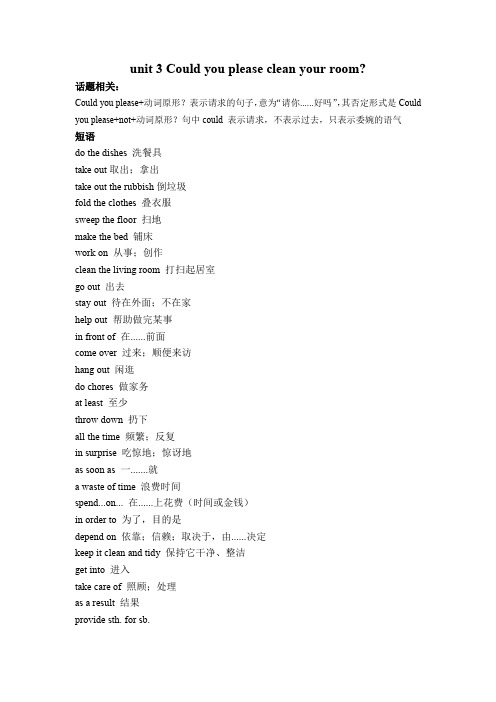
unit 3 Could you please clean your room?话题相关:Could you please+动词原形?表示请求的句子,意为“请你......好吗”,其否定形式是Could you please+not+动词原形?句中could 表示请求,不表示过去,只表示委婉的语气短语do the dishes 洗餐具take out取出;拿出take out the rubbish倒垃圾fold the clothes 叠衣服sweep the floor 扫地make the bed 铺床work on 从事;创作clean the living room 打扫起居室go out 出去stay out 待在外面;不在家help out 帮助做完某事in front of 在......前面come over 过来;顺便来访hang out 闲逛do chores 做家务at least 至少throw down 扔下all the time 频繁;反复in surprise 吃惊地;惊讶地as soon as 一.......就a waste of time 浪费时间spend...on... 在......上花费(时间或金钱)in order to 为了,目的是depend on 依靠;信赖;取决于,由......决定keep it clean and tidy 保持它干净、整洁get into 进入take care of 照顾;处理as a result 结果provide sth. for sb.=provide sb. with sth. 为某人提供某物a developed country 一个发达国家a developing country 一个发展中国家a life of independence 独立的生活an independent country 一个独立自主的国家have no idea “不知道”=don't knowtake care of “照顾;处理”=look after=care for take good care of “好好照顾......”=look after.....well as a result 结果;因此as a result of 由于.......;作为......结果句型和固定结构finish doing sth. 做完某事neither+连系动词be/助动词/情态动词+主语. .....也不hate to do sth. 厌恶做某事let sb. do sth. 让某人做某事spend...doing sth. 花费......做某事provide sth. for sb. 向某人提供某物learn to do sth. 学会做某事learn how to do sth. 学会怎样做某事do one's part in (doing) 尽自己的职责做某事as.....as... 与.......一样not as/so...as... 不如......borrow sth. from sb. “向某人借某物”hate sb./sth. 讨厌某人/某物hate to do sth./doing sth. 厌恶做某事enjoy doing sth 喜欢做某事buy sb.sth.=buy sth. for sb. "给某人买某物invite sb. to +地点名词“邀请某人到某地”invite sb. to do sth. “邀请某人做某事”make sb. do sth. 让/使某人做某事help with sth. =help (to) do sth.帮忙做某事There is no need for sb. to do sth.“对于某人来说,没有必要做某事”解释minute n.分钟;片刻(1)any minute now “随时;马上;在任何时刻”,表示事情有可能在极短的时间内发生或眼下就要发生。
[K12学习]八年级英语下册 Unit 3 Could you please clean your
![[K12学习]八年级英语下册 Unit 3 Could you please clean your](https://img.taocdn.com/s3/m/3b3c044e02768e9951e7386b.png)
Unit 3 Could you please clean your roomIn China ,more and more middle school students are getting shorter sleeping time than be f ore. 1. _________ because they have much homework to do. Some homework is given by their teachers and some b y their parents. Also 2_________.They are not careful enough while they do th e ir homework, 3_________.Some students spend too much time watching TV or playing computer games. They stay up very late. Some student have to get up early every morning on week d ays to get to school on time by bus or by bike. 4. _________.Schools and parents should cut down some of the homework so that children c an enjoy more than nine hours of sleep every night for their health. For children, we should make best use of our time. 5._________,we will find it much better for both our study and health.A.Some homework is too difficultB. Most students sleep less than nine hours every night.C. When we have enough time for sleepingD. It can be a long way from home to schoolE. so it takes them a lot of timeF. Some students don’t know how to save time.G. Some students like to stay up late。
人教版英语八年级下册Unit3《Couldyoupleasecleanyourroom》说课稿
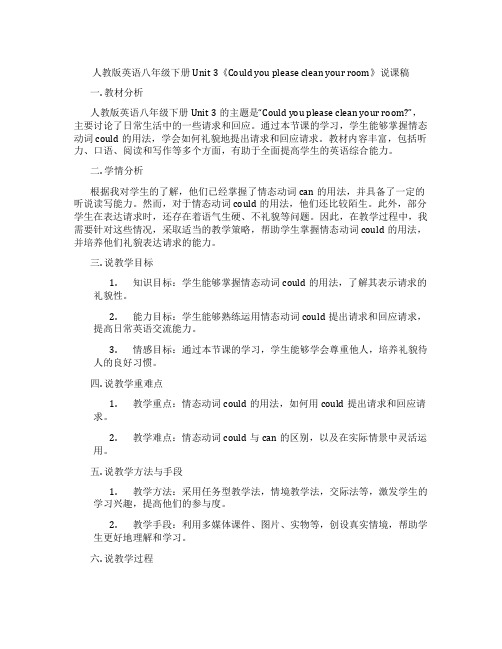
人教版英语八年级下册Unit 3《Could you please clean your room》说课稿一. 教材分析人教版英语八年级下册Unit 3的主题是“Could you please clean your room?”,主要讨论了日常生活中的一些请求和回应。
通过本节课的学习,学生能够掌握情态动词could的用法,学会如何礼貌地提出请求和回应请求。
教材内容丰富,包括听力、口语、阅读和写作等多个方面,有助于全面提高学生的英语综合能力。
二. 学情分析根据我对学生的了解,他们已经掌握了情态动词can的用法,并具备了一定的听说读写能力。
然而,对于情态动词could的用法,他们还比较陌生。
此外,部分学生在表达请求时,还存在着语气生硬、不礼貌等问题。
因此,在教学过程中,我需要针对这些情况,采取适当的教学策略,帮助学生掌握情态动词could的用法,并培养他们礼貌表达请求的能力。
三. 说教学目标1.知识目标:学生能够掌握情态动词could的用法,了解其表示请求的礼貌性。
2.能力目标:学生能够熟练运用情态动词could提出请求和回应请求,提高日常英语交流能力。
3.情感目标:通过本节课的学习,学生能够学会尊重他人,培养礼貌待人的良好习惯。
四. 说教学重难点1.教学重点:情态动词could的用法,如何用could提出请求和回应请求。
2.教学难点:情态动词could与can的区别,以及在实际情景中灵活运用。
五. 说教学方法与手段1.教学方法:采用任务型教学法,情境教学法,交际法等,激发学生的学习兴趣,提高他们的参与度。
2.教学手段:利用多媒体课件、图片、实物等,创设真实情境,帮助学生更好地理解和学习。
六. 说教学过程1.导入:通过播放一段关于孩子们日常生活的视频,引出本节课的主题“Could you please clean your room?”。
2.新课呈现:介绍情态动词could的用法,并通过例句展示如何用could提出请求和回应请求。
人教新目标英语八年级下册讲义—Unit 3 Could you please clean your…

新目标八年级下册Unit 3 Could you please clean your room?讲义一、词性转换Section A1.sweep →(pt.)swept2.throw →(pt.) threw3.fold→(pt.) folded Section B1. lend →(pt.) lent2. hate →(pt.) hated3. stress →(v.) stress4. waste →(v.) waste5. provide →(pt.) provided6. depend→(pt.)depended7. independence →(adj.) independent8. fairness →(adj.) fair9. unfair →(反义词)fair二、短语归纳1. do the dishes 洗餐具2. take out the rubbish倒垃圾3. fold your clothes叠衣服4. sweep the floor 扫地5. make your/the bed 整理床铺6. go out for dinner 出去吃饭7. throw down 扔下8.in surprise 惊讶地9. hang out 闲逛10. hate to do sth. 讨厌做某事11. do chores 做杂务12.enough stress足够的压力13. in order to为了14. provide sth. for sb.向某人提供某物15. get good grades取得好成绩16.mind doing sth. 介意做某事17. depend on依赖;依靠18. look after 照顾,照看19. keep it clean and tidy保持它干净整洁20. get into 进入21. take care of 照顾22. as a result 结果23. do one’ s part in (doing )sth. 做某人分内的事24. get a ride 搭车25.stay out late在外面待到很晚三、句型集萃1. Could you please help out with a few things? 你能帮忙做些事情吗?2.Mom will be back from shopping at any minute now. And she won’t be happy if she sees this mess.妈妈现在随时都会购物回来,如果她看到这些一团糟,会不高兴的。
八年级英语下册 Unit 3 Could you please clean your

a clean and comfortable environment at home for their children. And anyway, I think doing
chores is not so difficult. I do not mind doing them.
Ms. Miller
Could you please clean your room?Section B2a-2e
Language Goals:
➢Make polite requests 礼貌提出请求
➢Ask for permission 请求允许
2a Discussion
1. Do you often do chores at home?
Dear Sir, I think it is important for children to learn how to do chores and help their parents with housework. It’s not enough to just get good grades at school. Children these days depend on their parents too much. They are always asking, “Could you get this for me?” or “Could you help me with that?” Doing chores helps to develop children’s independence and teaches them how to look after themselves. It also helps them to understand the idea of fairness. Since they live in one house with their parents. They should know that everyone should do their part in keeping it clean and tidy. Our neighbors’ son got into a good college but during his first year, he had no idea how to take care of himself. As a result, he often fell ill and his grades dropped. The earlier kids learn to be independent, the better it is for their future. Mr. Smith
八年级英语下册 Unit 3 Could you please clean your

Unit 3教学过程 Unit 3 Could you please clean your room?一、课堂导入1. Could you please clean your room?2. Could you please take out the rubbish?二、复习习惯用法、搭配1. take one’ s temperature 量体温2. in the same way 以同样的方式3. without thinking twice 没有多想4. to one’ s surprise 使....... 惊讶的5. have problems breathing 呼吸困难6. be used to doing sth. 习惯做某事7. run out (of) 用完;用尽 8. so that 以便9. so. . . that 如此… …以至于… 10. keep on doing sth. 继续或坚持做某事11. make a decision to do 做出决定 12. take risks 冒险三、知识讲解:重点语法、句型知识点 1 习惯用法、搭配1.go out for dinner 出去吃饭2.get a ride 搭车3.work on 从事4.finish doing sth. 完成做某事5.take out the rubbish 倒垃圾6.fold your/the clothes 叠衣服7.no problem 没问题8.welcome sb. 欢迎某人e home from school/work放学/下班回家10.throw down 扔下e over 过来12.take sb. for a walk 带某人去散步13.all the time 一直;总是14.shout back 大声回应15. a comfortable home 一个舒适的家16.in surprise 惊讶地17.get something to drink 拿点喝的东西18.pass sb. sth. 把某物传给某人19.lend sb. sth. 把某物借给某人20.get sth. wet 使某物弄湿21.hate to do sth. 讨厌做某事22.do chores 做杂务23.help sb. (to ) do /with sth 帮助某人干某事24.buy some snacks买些小吃25.make sb. do sth. 使某人做某事26.enough stress足够的压力27.waste of time浪费时间28.in order to为了29.mind doing sth. 介意做某事30.depend on依赖;依靠31.develop children’s independence发展孩子的独立性32.look after/take care of 照顾;照看37.do one’s part in (doing ) sth.做某人分内的38. There is no need for sb. to do对某人来说没必要做......知识点2I don’t understand why some parents make their kids help with housework and chores at home. 我不理解为什么有些父母在家让孩子们帮忙做家务和杂务。
人教版八年级英语下册Unit 3 Could you please clean your roo

anyway还可用来表示“不管怎样;无论如何”之意。例如:
It’s just a cold. But anyway, you should still see the doctor.
这只不过是感冒,但不管怎样,你还是应该看看医生。
★[写一写]
1) What do you often do to help your parents at home?
2) Do you think kids should help out with chores at home?
2、听材料并跟读材料,模仿语音、语调、停顿。
3、学生朗读课文。
当 堂 检 测
根据句意,用括号内所给单词的适当形式填空。
教学内容和学法指导
学生活动与笔记
预习准备
★Language points
1)It is the parents’ job to provide a clean and comfortable environment at home for their children.
此处代词it仅为形式上的主语,真正的主语是to provide … for their children。我们也可将It is one’s job (duty, …) to do something.视为一个固定的句型,表示“做某事是某人的工作(职责等)”。如:
4. Mr. Li and Mr. Wang are both myneighbors(neighbor).
5. Why did the man make the little boycarry(carry) think doing chores is not so difficult.
八年级英语下册 Unit 3 Could you please clean your room短语、句型、作文汇总 (新版)人教新目标版
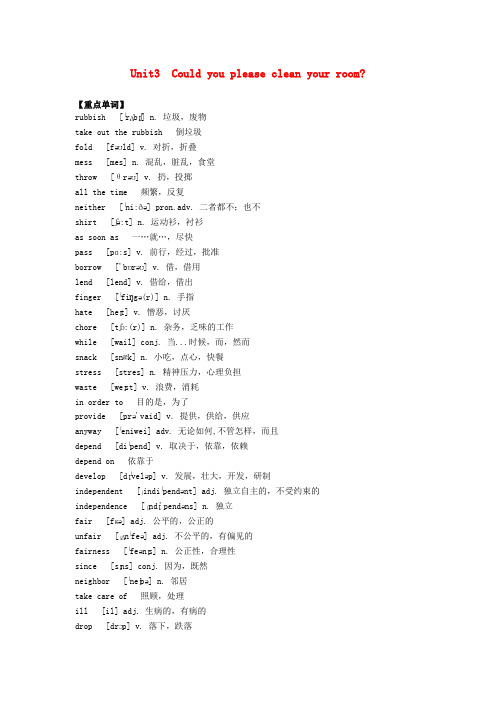
Unit3 Could you please clean your room?【重点单词】rubbish [ˈrʌbɪʃ] n. 垃圾,废物take out the rubbish 倒垃圾fold [fəʊld] v. 对折,折叠mess [mes] n. 混乱,脏乱,食堂throw [θrəʊ] v. 扔,投掷all the time 频繁,反复neither [ˈni:ðə] pron.adv. 二者都不;也不shirt [ʃə:t] n. 运动衫,衬衫as soon as 一…就…,尽快pass [pɑ:s] v. 前行,经过,批准borrow ['bɒrəʊ] v. 借,借用lend [lend] v. 借给,借出finger [ˈfiŋgə(r)] n. 手指hate [heɪt] v. 憎恶,讨厌chore [tʃɔ:(r)] n. 杂务,乏味的工作while [wail] conj. 当...时候,而,然而snack [snæk] n. 小吃,点心,快餐stress [stres] n. 精神压力,心理负担waste [weɪst] v. 浪费,消耗in order to 目的是,为了provide [prə'vaid] v. 提供,供给,供应anyway [ˈeniwei] adv. 无论如何,不管怎样,而且depend [diˈpend] v. 取决于,依靠,依赖depend on 依靠于develop [dɪˈveləp] v. 发展,壮大,开发,研制independent [ˌindiˈpendənt] adj. 独立自主的,不受约束的independence [ˌɪndɪ'pendəns] n. 独立fair [fɛə] adj. 公平的,公正的unfair [ˌʌnˈfeə] adj. 不公平的,有偏见的fairness [ˈfeənɪs] n. 公正性,合理性since [sɪns] conj. 因为,既然neighbor [ˈneɪbə] n. 邻居take care of 照顾,处理ill [il] adj. 生病的,有病的drop [drɔp] v. 落下,跌落【重点短语】1.go out for dinner 出去吃饭2.stay out late 在外面待到很晚3.go to the movies 去看电影4.get a ride 搭车5.work on 从事6.finish doing sth. 完成做某事7.clean and tidy 干净整洁的8.do the dishes 洗餐具9.take out the rubbish 倒垃圾10.fold your/the clothes 叠衣服11.sweep the floor 扫地12.make your/the bed 整理床铺13.clean the livng room 打扫客厅14.no problem 没问题15.welcome sb. 欢迎某人e home from school/work放学/下班回家17.throw down 扔下18.sit down 坐下e over 过来20.take sb. for a walk 带某人去散步21.all the time 一直;总是22.all day/evening 整曰/夜23.do housework 做家务24.shout back 大声回应25.walk away 走开26.share the housework 分担家务27.a comfortable home 一个舒适的家28.in surprise 惊讶地29.get something to drink 拿点喝的东西30.watch one show 观看一个节目31.hang out 闲逛32.pass sb. sth. 把某物传给某人33.lend sb. sth. 把某物借给某人34.get sth. wet 使某物弄湿35. hate to do sth. 讨厌做某事36.do chores 做杂务37.help sb. (to ) d o /with sth•帮助某人干某事38.bring a tent带顶帐篷来39.buy some snacks买些小吃40.go to the store去商店41.invite sb. to a party邀请某人参加聚会42.make sb. do sth. 使某人做某事43.enough stress足够的压力44.a waste of time浪费时间45.in order to为了46.get good grades取得好成绩47.mind doing sth. 介意做某事48.depend on依赖;依靠49.develop children ’ s independence发展孩子的独立性50.look after/take care of 照顾;照看51.do one’ s part in (doing ) sth. 做某人分内的事【重点句型】1.Could you please clean your room? 你能打扫一下你的房间吗?2. I have to do some work. 我必须干些活。
八年级英语下册 Unit 3《Could you please clean your

Unit 3《Could you please clean your room》一、教材分析本单元的主要语言功能是礼貌地请求别人做某事和向他人请求允许做某事,语法项目是Could you please do…?和Could I do …?从教材的整合来说它是Can you do…?(表请求)和Can I do …?(请求许可)的延续,只是表达更委婉,更有礼貌。
从本单元来说,它既是本单元的基本语言内容,又为本单元知识扩展和综合语言运用奠定坚实的基础。
本单元话题又贴近他们的生活,应该会有话可讲,有话要讲。
二、重、难点知识点提示重点:让学生掌握词汇的运用以及用Could you please do…? Could I do…?两个句型提出请求和请求许可。
难点:本节课表示家务的动词词组较多,较难记忆和运用。
三、重点知识点讲解:考点(一)词语辨析Ⅰ. either/neither /none/ all/ both的用法。
either:1.否定句中的“也”。
如 A:I don't like music.B: Me either.(A说:我不喜欢音乐。
B说:我也是)2.两者其中之一。
如:A:Which would you like to drink,water or tea? B:Either of them is ok.(A说:你喜欢喝水还是茶?B:说哪种都行。
)neither:两者都不。
如:Neither of my parents has been to Baijing.(我父母两人都没去过北京)。
特殊句式:neither…nor… Neither you nor me am a doctor.(不论你还是我都不是医生)此结构中be的形式根据临近它的主语而定,即就近原则。
表达“……也不……” 则用“Neither /Nor + be / V助 / V情 + 主”—The first one wasn’t bad. — Neither was the second.both:两者都。
八年级英语下册 Unit 3 Could you please clean your
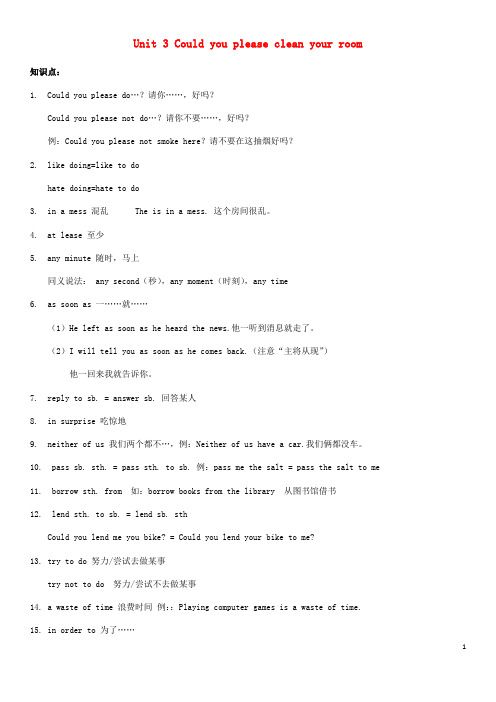
Unit 3 Could you please clean your room知识点:1. Could you please do…?请你……,好吗?Could you please not do…?请你不要……,好吗?例:Could you please not smoke here?请不要在这抽烟好吗?2. like doing=like to dohate doing=hate to do3. in a mess 混乱 The is in a mess. 这个房间很乱。
4. at lease 至少5. any minute 随时,马上同义说法: any second(秒),any moment(时刻),any time6.as soon as 一……就……(1)He left as soon as he heard the news.他一听到消息就走了。
(2)I will tell you as soon as he comes back.(注意“主将从现”)他一回来我就告诉你。
7.reply to sb. = answer sb. 回答某人8.in surprise 吃惊地9.neither of us 我们两个都不…,例:Neither of us have a car.我们俩都没车。
10. pass sb. sth. = pass sth. to sb. 例:pass me the salt = pass the salt to me11. borrow sth. from 如:borrow books from the library 从图书馆借书12. lend sth. to sb. = lend sb. sthCould you lend me you bike? = Could you lend your bike to me?13.try to do 努力/尝试去做某事try not to do 努力/尝试不去做某事14.a waste of time 浪费时间例::Playing computer games is a waste of time.15.in order to 为了……例: In order to get good grades, we should spend more time on schoolwork.为了取得好成绩,我们应该多花点时间学习。
初中英语人教版八年级下册《Unit 3 Could you please clean your ro
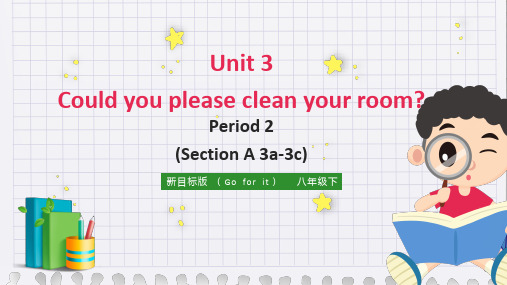
My mom did not say anything and walked away. For one week, she did not do any housework and neither did I. Finally, I could not find a clean dish or a clean shirt. The next day, my mom came home from work to find the house clean and tidy. “What happened?” she asked in surprise. “I’m so sorry, Mom. I finally understand that we need to share the housework to have a clean and comfortable home,” I replied.
Reasons( 理由) do my homework
study for a test visit my friends
Mom: Peter, could you please …? Peter: Yes, sure./Certainly... /Sorry, I can’t . I have to/I’m ...
2. I’m just as tired as you are! as ... as 意为 “和……一样” ,表示同级的比较。 使用时要注意第一个as为副词,第二个as为 连词。其基本结构为:as + adj./ adv. + as。
e.g. This film is as interesting as that one. 这部电影和那部电影一样有趣。 Your pen writes as smoothly as mine. 你的钢笔书写起来和我的一样流畅。
新人教版八年级英语下册第三单元知识点

Unit3 Could you please clean your room?一.情态动词could 的用法1. 提出礼貌的要求............................. Could you please (not) do sth ? 请你(做)好吗?用于提出请求,希望得到对方的肯定回答,说话的语气比较客气委婉。
Could不是can的过去式,是委婉、礼貌的说法。
回答用can. 肯定回答:Yes,sure./ Yes, I can./Of course,I can./ Certainly./No problem./ With pleasure .否定回答:Sorry , I ca n 'I t m afraid lean 't. I have to …,1'm goi ng to …(说明理由)2. 表示请求许可Could I do a sth? 我可以做..... 吗?肯定回答:Yes, you can ./ Yes ,please / Of course / Certainly./ No problem.否定回答:Sorry , you can'/t I'm afraid you can 't.3. could 为can 的过去式,表示过去的能力。
= was / were able toSection A1. take out the rubbish 把垃圾带出去2. do the dishes = wash the dishes 洗碗碟3. fold your clothes 折衣服4. sweep the floor 扫地5. make your bed 整理床铺6. clean the living room 打扫起居室7. do some washing/ shopping/ cleaning 洗衣服/ 购物/ 做清洁8. go out for dinner 出去吃晚饭9. go to the movies 去看电影10. stay out late/ until nine 呆到很晚/ 呆到9 点钟11. get a ride 撘车12. give sb a ride to town 开车送sb 到镇上13. need to do something 需要做……14. have to do something 不得不做……15. help out with a few things 帮助做些事情16. at least 至少,多指数量或程度上的最低限度。
- 1、下载文档前请自行甄别文档内容的完整性,平台不提供额外的编辑、内容补充、找答案等附加服务。
- 2、"仅部分预览"的文档,不可在线预览部分如存在完整性等问题,可反馈申请退款(可完整预览的文档不适用该条件!)。
- 3、如文档侵犯您的权益,请联系客服反馈,我们会尽快为您处理(人工客服工作时间:9:00-18:30)。
情态动词can与could用法归纳
一、表示能力
(1) 表示现在的能力,用can:
I can’t decide which to choose. 我不能决定选哪个好。
While I sympathize, I can’t really do much to help. 尽管我很同情,我却不能真正帮多少忙。
(2) 表示将来的能力,通常不用can或could,而用be able to的将来时态:
I’ll be able to speak French in another few months. 再过几个月我就会讲法语了。
One day people will be able to go to the moon on holiday. 总有一天人们可以到月球上去度假。
但是,若表示现在决定将来是否有能力做某事,则可用 can:
Can you come to the party tomorrow? 你明天能来参加我们的聚会吗?
(3) 表示过去的能力,有时可用could,有时不能用could,具体应注意以下几点:
① 若表示过去一般的能力(即想做某事就随时可做某事的能力),可用could:
Could you speak English then? 那时候你会说英语吗?
② 若表示过去的特定能力(即在过去特定场合做某事的能力),则不能用could,而用was (were) able to do sth.,或用 managed to do sth.,或用 succeeded in doing sth. 等。
He studied hard and was able to pass the exam. 他学习很努力,所以考试能及格。
At last he succeeded in solving the problem. 他终于把那个问题解决了。
【注】could 不用来表示过去特定能力通常只限于肯定句,否定句或疑问句中,它则可以表示过去特定的能力:
I managed to find the street, but I couldn’t find her house. 我想法找到了那条街,但没找到她的房子。
(前句为肯定句用managed to,不用could,后句为否定句,可用could) 另外,could还可与表示感知的动词(如see, hear, smell, taste, feel, understand等)连用表示的特定能力:
Looking down from the plane, we could see lights on the runway. 从飞机上向下看,我们可以看见机场跑道上的点点灯火。
还有在间接引语中,could也可表示过去特定的能力:
He said he could see me next week. 他说他下周能见我。
二、表示许可
(1) 对于现在或将来的“许可”,要区分以下两种情况:
① 表示请求允许(即请求别人允许自己做某事),两者均可用,但用could 语气更委婉:Can (Could) I come in?
我可以进来吗?
【注】此时也可用may或might,其中might和could均不表过去,只表委婉语气。
② 表示给予允许(即自己允许别人做某事), 一般只用 can,而不用 could:
“Could [Can] I use your pen? ” “Yes, of course you can.”“我可以借用你的钢笔吗?”“当然可以。
”(不能说Yes, you could.)
(2) 对于过去的“许可”,也要区分以下两种情况:
① 表示过去一般性允许(即表示某人随时都可以做某事),用can的过去式could:
When I lived at home, I could watch TV whenever I wanted to. 我住在家里时, 想什么时候看电影就可以什么时候看。
(一般性允许)
② 表示过去特定的允许(即表示在过去某一特定情况下允许进行某一特定的活动),则不用could,而需换成其他表达(如had permission, was [were] allowed to):
I was allowed to see the film yesterday evening. 昨天晚上允许我去看了电影。
(特定的允许,不能用 could)
三、表示推测
(1) 对现在或将来的推测,两者均可用,但can 通常只用于否定句或疑问句中,一般不用于肯定句,而could则可用于肯定句、否定句和疑问句:
It can’t be true. 那不可能是真的。
What can they be doing? 他们会在干什么呢?
We could go there this summer. 今年夏天我们可能要去那儿。
(将来可能性)
You could be right, but I don’t think you are. 你可能是对的,但我并不认为你是对的。
(现在可能性)
【注】can 有时也用于肯定句中表示推测,这主要见于:
① 表示理论上的可能性(即从理论上看是可能的,但实际未必会发生):
Even experienced teachers can make mistakes. 即使是有经验的教师也可能出错。
② 用于含有only等表示限制的肯定句:
“Who is that at the door? ” “It can only be the postman.”“门外是谁?”“只能
是邮递员。
”
③ 后接“be (get, seem, become)+形容词”,表示“有时会”、“时常会”等:
It can get very hot here. 这里有时会很热。
She can be very unpleasant. 她有时很令人讨厌。
(2) 对过去的推测,必须在 can, could 之后接动词的完成式。
但此时can仍只用于否定句或疑问句,不用于肯定句;而could则可用于各种句型:
He can’t (couldn’t) have seen her there. 他不可能在那儿见到她。
He could have gone home. 他可能已回家了。
【注】could后接动词的完成式,除表示对过去的推测外,还有以下用法(不用can):
① 表示过去没有实现的可能性(即某事本来可以发生,却没发生):
He could have told her, but he didn’t choose to. 他本来可以告诉她的,但他却没有。
② 用来委婉地责备某人过去应该做某事而没有去做:
You could ask me before you use my phone. 你打电话之前本来可以问我一声。
You could have helped me why did you just sit and watch? 你本可帮助我的,为什么只坐在一旁瞧着?
③ 表示“差点儿就要”:
She could have cried.她差点哭了。
